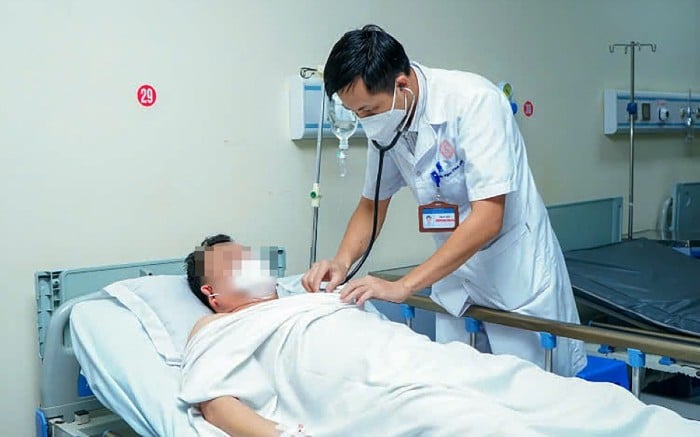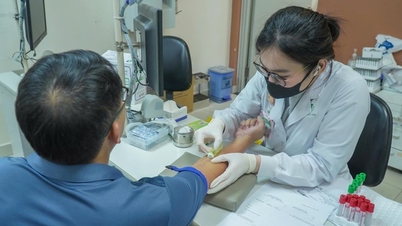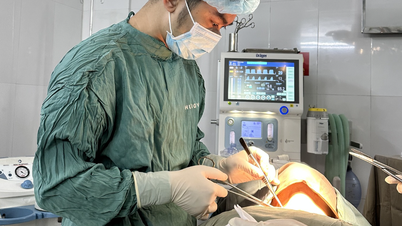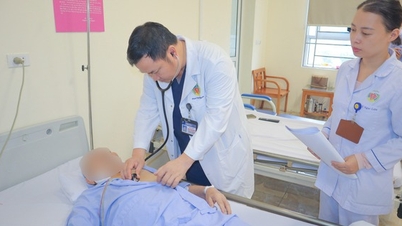Increased number of strokes due to changing weather
In recent weeks, major hospitals in Hanoi have recorded a sudden increase in the number of patients. At Friendship Hospital, the Emergency Department receives an average of 30-40 cases per day, many times more than before, mainly respiratory and cardiovascular diseases. Doctor Vu Duc Long, Deputy Head of the Emergency Department, said that on peak days, the hospital receives up to 5 stroke cases, while previously only 1-2 cases were recorded every few days.
 |
| Illustration photo. |
At the Stroke Center of Bach Mai Hospital, Associate Professor, Dr. Mai Duy Ton, Director of the center, said the number of hospitalizations increased by about 10% in the past week, from 50-55 cases to up to 60 cases per day. Similar situations were recorded at the 108 Military Central Hospital and Hanoi Medical University Hospital.
Many patients are admitted to the hospital when their condition has already progressed. A 92-year-old man was found drowsy and unconscious early in the morning by his family and rushed to the emergency room.
The diagnosis confirmed that the patient had suffered a stroke. Due to his old age and weak immune system, the doctor assessed that reperfusion therapy would be difficult. Another 95-year-old man was admitted to the hospital with severe fatigue, difficulty breathing, and a positive influenza A test. The patient was diagnosed with severe pneumonia and required combined antibiotic treatment and mechanical ventilation due to severe respiratory failure.
At the Central Hospital for Tropical Diseases, nearly 50 patients with influenza A are being treated, most of them children. A 16-month-old baby was admitted with a high fever, cough with phlegm, and fatigue.
Tests showed that the child was positive for influenza A, chest X-ray showed signs of severe bacterial infection, white blood cell count increased 10 times normal. The doctor said that if not intervened early, the child could suffer acute respiratory failure.
According to experts, the main cause is the "capricious" weather, with erratic temperature changes that make it difficult for the body, especially the elderly and children, to adapt.
“Cold weather causes blood vessels to constrict, leading to increased blood pressure and the formation of blood clots. The risk of stroke can increase by up to 80% when temperatures drop sharply,” said Dr. Nguyen Tien Dung, Deputy Director of the Stroke Center, Bach Mai Hospital.
Although winter did not come earlier than many years, in October, the North experienced three strong cold spells that caused temperatures to drop sharply, creating a distinctly cold feeling. The early appearance of La Nina also contributed to causing severe cold spells with prolonged rain and fog, different from the usual dry cold.
Doctors say many people are still subjective, not paying attention to keeping their bodies warm or wearing masks when going out, making respiratory and cardiovascular diseases easy to develop.
To prevent, the elderly, children and people with underlying diseases need to pay special attention to keeping warm and limit going out in cold weather, especially early in the morning.
In addition, it is necessary to improve nutrition, supplement vitamins and minerals to improve resistance. People should not bathe too late at night, should use warm water and shorten bathing time. In addition, should get a flu vaccine every year, wash hands regularly and wear masks in public to effectively prevent disease.
Myocarditis complications due to stopping thyroid medication
People with thyroid disease who stop taking medication on their own or take it irregularly are at risk of facing serious cardiovascular complications such as myocarditis, heart failure, arrhythmia, etc., which can be life-threatening.
The Emergency Department, Central Endocrinology Hospital has just admitted patient TTA, 30 years old, from Bac Ninh , admitted with chest pain, anxiety, and prolonged palpitations.
Patient A. has a history of Basedow's disease (an autoimmune disease of the thyroid gland) and has been treated at the Central Endocrinology Hospital for 2 years. However, the patient recently stopped taking medication for 2 months. In the early morning of October 13, the patient suddenly had left chest pain radiating to the back, accompanied by a feeling of anxiety and palpitations lasting more than 30 minutes.
Doctors said that at the time of admission, the patient was alert, responsive, pulse 121 times/minute, blood pressure 120/70 mmHg, SpO₂ 96%, body temperature 37°C. The thyroid gland was diffusely enlarged grade Ib, soft, with no murmur.
Electrocardiogram results showed sinus tachycardia, with signs suggestive of myocardial injury. Echocardiogram showed preserved systolic function (EF 63%), no regional wall motion abnormalities, and no pericardial effusion.
Based on clinical and paraclinical signs, the patient was diagnosed with myocarditis and Graves' disease. The patient was immediately treated with emergency care, cardiovascular stabilization, pain relief, continuous monitoring via monitor, antithyroid drugs, acid secretion inhibitors, and was transferred to a specialized cardiovascular hospital. Currently, the patient's condition is stable.
According to endocrinologists, thyroid disease is a general term for hormone disorders caused by the thyroid gland producing too much or too little.
When the thyroid gland produces too much hormone to maintain the body's normal metabolic rate, hypothyroidism occurs. When the thyroid gland produces too much hormone, the metabolic rate increases abnormally, leading to hyperthyroidism. Other diseases that may not be related to the thyroid gland's hormone production include goiter (goiter) or thyroid cancer.
Thyroid disease can affect anyone, with women being 5-8 times more likely to develop the disease than men. Other risk factors include a family history of thyroid disease; diseases such as pernicious anemia, type 1 diabetes, primary adrenal insufficiency, rheumatoid arthritis, Turner syndrome; use of drugs containing a lot of iodine (amiodarone); people over 60 years old, especially women; or having been treated for thyroid disease or cancer.
In the case of patient A., according to the recommendations of the doctors of the Emergency Department, Central Endocrinology Hospital, Basedow's disease is a common endocrine disease. However, if the patient does not comply with treatment, arbitrarily stops taking medication or takes medication irregularly, there is a risk of facing serious cardiovascular complications, including myocarditis, heart failure, arrhythmia, which can be life-threatening.
The case of the TTA patient is a warning about the importance of regular monitoring and proper treatment. People with Graves' disease need to follow their doctor's instructions, not stop taking medication on their own even if they feel their symptoms have improved, and should immediately go to an endocrinology clinic if they experience unusual symptoms such as chest pain, palpitations, fatigue, weight loss, hand tremors, or heart rhythm disturbances.
Successful treatment of a 7-year-old girl with alopecia totalis with Janus kinase inhibitors
A 7-year-old girl who suffered from total hair loss after a long period of ineffective treatment was cured by doctors at the Central Dermatology Hospital with Janus kinase (JAK) inhibitors. After a year of persistent treatment, her hair grew back completely, her hair roots were strong, and no side effects were recorded.
The family said that at first, the child only had small oval patches of hair loss. Although they took the child to many places for examination and treatment, the condition did not improve, and even progressed to total hair loss on the scalp. When he arrived at the Central Dermatology Hospital, the child was directly examined by Dr. Vu Thai Ha, Head of the Department of Research and Application of Stem Cell Technology.
Through medical history and clinical examination, the doctor found that the baby's scalp was smooth, not red, not scaly, not accompanied by hair loss in other areas or systemic diseases. No one in the family had a similar disease. Based on the characteristics of the lesions, the doctor diagnosed the baby with alopecia totalis, a severe form of alopecia areata.
In-depth tests such as Trichoscopy (hair analysis), blood tests, thyroid function and antinuclear antibody (ANA hep-2) showed results consistent with a diagnosis of alopecia totalis, without detecting thyroid autoimmune disease or other immune disorders.
Due to the severity of the hair loss, the patient was treated with dexamethasone combined with methotrexate, then switched to cyclosporin, but both regimens were ineffective. After consultation, the doctors decided to switch to oral Janus kinase inhibitor treatment.
After a short time, the hair began to grow back. The child continued to be prescribed medication, and was regularly monitored clinically and with laboratory tests. After a year, the hair covered the scalp, the hair pull test was negative, and there were no signs of health abnormalities.
According to Dr. Vu Thai Ha, alopecia areata (AA) is a non-scarring hair loss disease, considered an organ-specific autoimmune disease, caused by CD8 T-cells mistakenly attacking hair follicles. About 5% of cases can progress to total scalp hair loss and 1% to total body hair loss. The disease is common in young people, and is the most common form of hair loss in children, with an equal incidence in men and women.
In recent years, Janus kinase inhibitors (JAK inhibitors) have opened up new treatment options for patients with alopecia areata. These drugs block T-cell-mediated inflammation by inhibiting the JAK-STAT signaling pathway, thereby controlling the autoimmune attack on hair follicles.
The above 7-year-old patient is a clear example. After traditional methods were ineffective, the doctor discussed the benefits and risks with the family, then prescribed off-label treatment with JAK drugs. During the treatment, the patient was closely monitored, the results showed outstanding effectiveness, hair grew back completely without any significant side effects.
Currently, the Department of Research and Application of Stem Cell Technology of the Central Dermatology Hospital is managing nearly 1,000 patients with alopecia areata, including many severe cases. The unit has applied many treatment methods such as topical medications, systemic medications, local procedures (corticoid injections, Intracel...) and especially JAK inhibitors to optimize effectiveness.
Doctors recommend that people experiencing unusual hair loss should visit a dermatology clinic for examination and proper treatment. Using drugs on your own or treating yourself by word of mouth can make the condition worse, damage hair follicles and leave long-term consequences.
Source: https://baodautu.vn/tin-moi-y-te-ngay-911-tang-so-luong-mac-tim-mach-ho-hap-dot-quy-do-thoi-tiet-giao-mua-d430918.html











































































































Comment (0)